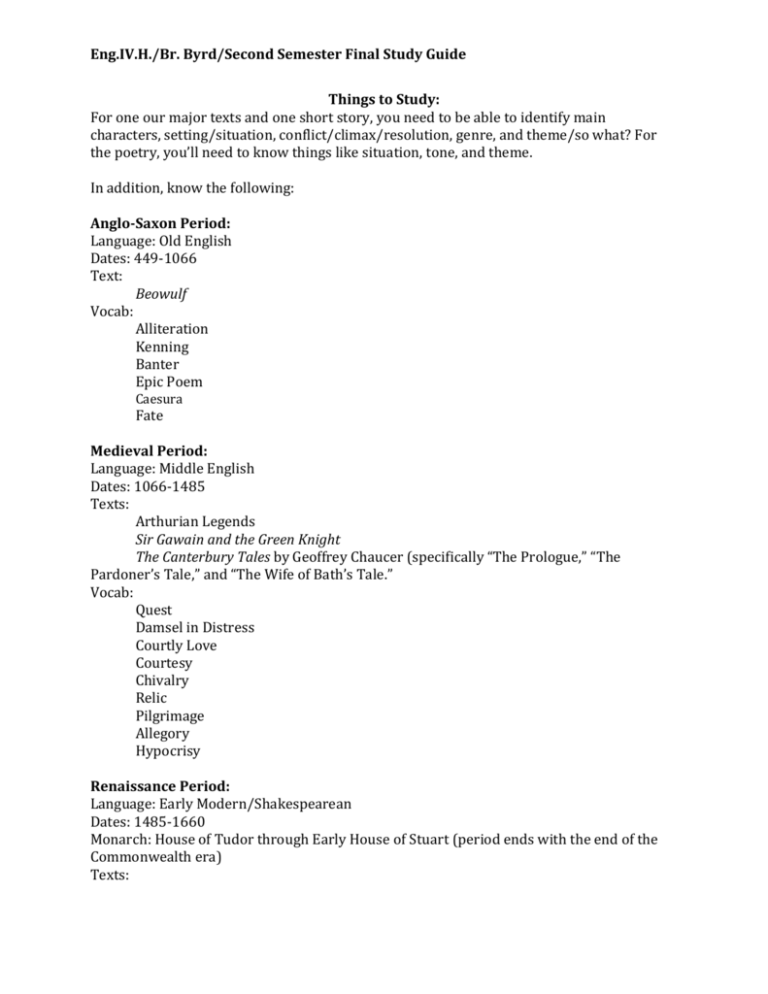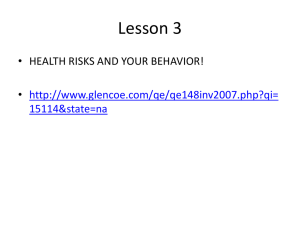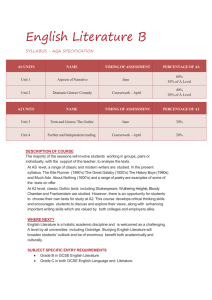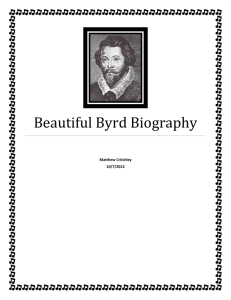HERE
advertisement

Eng.IV.H./Br. Byrd/Second Semester Final Study Guide Things to Study: For one our major texts and one short story, you need to be able to identify main characters, setting/situation, conflict/climax/resolution, genre, and theme/so what? For the poetry, you’ll need to know things like situation, tone, and theme. In addition, know the following: Anglo-Saxon Period: Language: Old English Dates: 449-1066 Text: Beowulf Vocab: Alliteration Kenning Banter Epic Poem Caesura Fate Medieval Period: Language: Middle English Dates: 1066-1485 Texts: Arthurian Legends Sir Gawain and the Green Knight The Canterbury Tales by Geoffrey Chaucer (specifically “The Prologue,” “The Pardoner’s Tale,” and “The Wife of Bath’s Tale.” Vocab: Quest Damsel in Distress Courtly Love Courtesy Chivalry Relic Pilgrimage Allegory Hypocrisy Renaissance Period: Language: Early Modern/Shakespearean Dates: 1485-1660 Monarch: House of Tudor through Early House of Stuart (period ends with the end of the Commonwealth era) Texts: Eng.IV.H./Br. Byrd/Second Semester Final Study Guide Poetry by: Queen Elizabeth I, Sir Thomas Wyatt, Sir Walter Raleigh, Christopher Marlowe, Edmund Spenser, William Shakespeare, Andrew Marvell, Robert Herrick, Richard Lovelace Sonnets Hamlet Macbeth Othello Vocab: Logos, Pathos, Ethos Monologue vs. Soliloquy Tragedy Humanism Lyric Elegy Ode Restoration and Enlightenment Period (Stuart and Early Georgian): Language: Early Modern Dates: 1660-1798 Monarchs: House of Stuart and House of Hanover (Charles II through George III) Texts: Excerpt from Paradise Lost by John Milton Oroonoko by Aphra Behn “A Modest Proposal” by Jonathan Swift “A Vindication of the Rights of Women” by Mary Wollstonecraft “A History of England” by Jane Austen Lady Susan by Jane Austen Vocabulary: Amanuensis Postlapsarian Epic Poem Iambic pentameter Enjambment Types of Irony: Verbal, Situational, Dramatic Satire: Horatian/Juvenalian Propaganda Generalization Parallelism Romantic Period (Late Georgian): Language: Modern Dates: 1798-1832 Monarchs: George III-George IV Texts: Romantic poetry by Wordsworth, Shelley, Keats, Byron, Blake, Coleridge Frankenstein by Mary Shelley Eng.IV.H./Br. Byrd/Second Semester Final Study Guide Vocab: Chart of Romantic Elements Galvanism Frame Narrative Epistolary Narrative Gothic Novel Novel of Manners Victorian Period: Language: Modern Monarchs: Queen Victoria + Prince Albert (her husband) Dates: 1837-1901 Texts we’ve studied: Wuthering Heights by Emily Bronte The Importance of Being Earnest by Oscar Wilde Vocab: Potboiler Bildungsroman Industrialization British Empire Comedy of Manners Farce Epigram Dandy Modern Period: Language: Modern Monarch: House of Windsor Dates: 1901-1950 Texts we’ve studied: Heart of Darkness Joseph Conrad “The Odour of Chrysanthemums” by D.H. Lawrence “The Dead” by James Joyce “The Day They Burned the Books” by Jean Rhys “The Garden Party” by Katherine Mansfield Vocab: Colonialism Imperialism Scramble for Africa Contemporary Period: Language: Contemporary English Dates: 1950-Present Monarchs: House of Windsor (George VI through Elizabeth II) Texts we’ve studied: “The Other Side of the Hedge” by E.M. Forster Eng.IV.H./Br. Byrd/Second Semester Final Study Guide Vocab: “Dead Men’s Path” by Chinua Achebe “A Woman on the Roof” by Doris Lessing “Bedtime Stories for Yasmin” by Robert Shearman “The Writer” by Ellis Sharp “The Voyage” by Ellis Sharp Stream of Consciousness British Monarchy House of Tudor (late 15th/16th/early 17th centuries): A: Henry VII: First Monarch of the House of Tudor B: Henry VIII: A’s son C: Edward VI: B’s son D: Lady Jane Grey (whose queenship is disputed, ‘cause it was so brief): A’s greatgranddaughter, C’s cousin E: Queen Mary I: B’s daughter F: Queen Elizabeth I: B’s daughter House of Stuart (17th/early 18th centuries): G: James I: Son of F’s cousin, Mary, Queen of Scots H: Charles I: Son of G Commonwealth/Protectorate Restoration I: Charles II: Son of H J: James II: Son of H, Brother of I Glorious Revolution of 1688 K: 1: William III (of House of Orange, Netherlands) & 2: Mary II: Daughter of J. L: Anne: Daughter of J, Sister of K2. House of Hanover (18th and 19th centuries): M: George I: Great-grandson of H. N: George II: Son of M. O: George III: Grandson of N. (This is “mad king George”, the king the Americans rejected.) P: George IV: Son of O. (He served as regent for his father during the king’s illness = Regency Era.) Q: William IV: Son of O, Brother of P. R: Victoria: Niece of P & Q. (+ Prince Albert) Houses of Windsor (20th and 21st Century): S: Edward VII: Son of R. (Last Monarch of the House of Saxe-Coburg & Gotha) T: George V: Son of S. (Changed name of house to House of Windsor) U: Edward VIII: Son of T. (Abdicated throne to marry American divorcee, Wallace Simpson.) V: George VI: Son of T, Brother of U. (The king in The King’s Speech.) W: Elizabeth II: Daughter of V. (Current monarch, long may she reign. Husband = Prince Philip. Children: Charles, Anne, Andrew, and Edward.) Eng.IV.H./Br. Byrd/Second Semester Final Study Guide Hamlet: There will be a portion of the exam dedicated to Hamlet. MLA formatting: You will be given three types of information pages (book w/one author, article from JSTOR, and an essay from an anthology). You will need to create a works cited page. Academic Interpretive Lenses: You will need to fill in the names of the A.I.L. next to their descriptions. Study the sheet I gave you at the beginning of the year. Oral Exam: (Last Week of Class) To prepare for the oral exam, type up your answer to the following question: What have you learned (from at least three) of the characters we have encountered in the texts for this class? Please relate your response to the essential question (What is the role of the hero in a hostile society?). For example, in what ways do you seek to be heroic? What are some of the faults you share with characters? You will receive more points the more unlike your response is from everyone else’s (so don’t ask your peers what they are writing). Time your reading. You only have five minutes. You will lose points if you go over.










